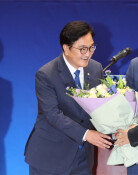[Editorial] Cooperation With the US
[Editorial] Cooperation With the US
Posted February. 05, 2010 09:06,
North Korea is in turmoil stemming from its currency revaluation of Nov. 30 last year. Before the measure, the price of rice was 20 North Korean won per kilogram, but this has gone up to 400 to 600 won. The value of the Norths new currency has fallen from 30 won per U.S. dollar to 500 won. With the number of people dying from hunger increasing, brawls between police and residents and murder are taking place.
The dire situation is apparently threatening the stability of the communist regime, with the North Korean people calling their leader Kim Jong Il without the honorific title Dear Leader. Pyongyang reportedly fired its top finance official Pak Nam Ki over the economic debacle caused by the currency revaluation. Such a step is sufficient, however, to allay the anger of the North Korean people. In this sense, South Korea should raise its guard against the possibility of a contingency caused by the North stemming from its crisis and military provocations against the South to distract North Koreans from their troubled economy. More than anything, cooperation between Seoul and Washington is needed to immediately respond militarily and politically to a contingency in Pyongyang. North Korea has shown reconciliatory gestures by receiving corn from South Korea and proposing bilateral dialogue, yet has raised tension by shooting artillery shells near the western inter-Korean maritime border.
U.S. Defense Secretary Robert Gates said Wednesday that if an emergency erupts on the Korean Peninsula, deployment of U.S. ground forces to South Korea will be delayed because of Washingtons commitments in Afghanistan and Iraq. U.S. Assistant Secretary of State Kurt Campbell said the U.S. is taking seriously South Korean fears over the transfer of wartime operational command from Washington to Seoul in 2012. Yet it is unknown how seriously the U.S. is reviewing this. If a problem happens in the first 60 to 70 days after a war breaks out, this could lead to dire consequences.
The North is apparently trying to overcome its economic crisis by securing foreign currency through wage hikes for North Korean workers at the Kaesong industrial complex and the resumption of South Korean tours to Mount Kumgang and Kaesong. Pyongyangs attempt to set up a development bank for attracting foreign investment and improve relations with the U.S. seeks to circumvent international sanctions on North Korea. Without recovering market functions and renouncing its nuclear ambition, North Korea will not see the normalization of production and distribution and the lifting of international sanctions.
In the event of an inter-Korean summit, the Lee Myung-bak administration must not repeat the mistake of the previous Kim Dae-jung and Roh Moo-hyun governments. The first two summits helped North Korea avert crisis without giving up its nuclear program. Whether through an inter-Korean summit or the six-party talks, Pyongyang must be reminded that the renunciation of nuclear weapons and becoming a normal country through reform and opening to the outside world are the only ways to get international help and conduct fundamental cooperation with the South. Close cooperation between South Korea and the U.S. is also crucial in this process.







